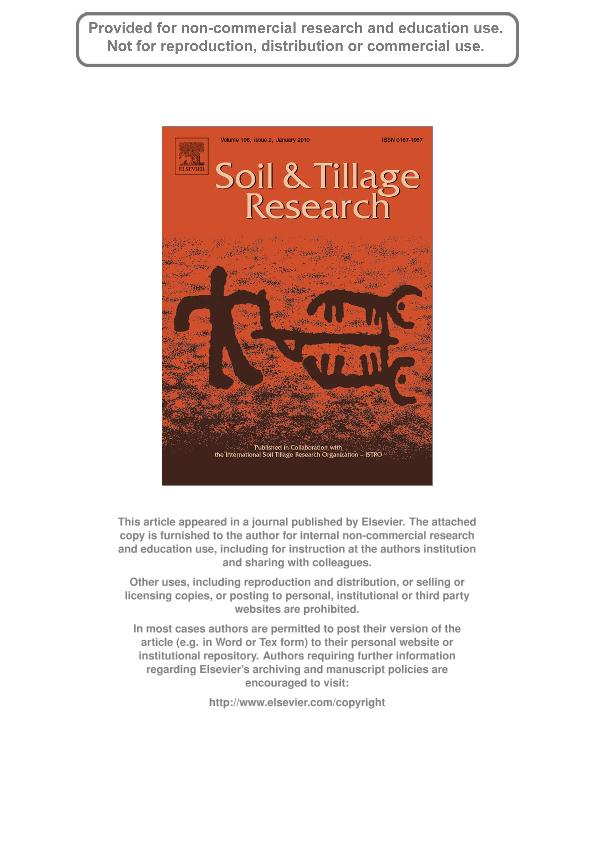Mostrar el registro sencillo del ítem
dc.contributor.author
Imhoff, Silvia del Carmen

dc.contributor.author
Kay, B. D.
dc.contributor.author
da Silva, A. Pires
dc.contributor.author
Hajabbasi, M. A.
dc.date.available
2019-05-08T20:03:01Z
dc.date.issued
2010-01
dc.identifier.citation
Imhoff, Silvia del Carmen; Kay, B. D.; da Silva, A. Pires; Hajabbasi, M. A.; Evaluating responses of maize (Zea mays L.) to soil physical conditions using a boundary line approach; Elsevier Science; Soil & Tillage Research; 106; 2; 1-2010; 303-310
dc.identifier.issn
0167-1987
dc.identifier.uri
http://hdl.handle.net/11336/75905
dc.description.abstract
The functional relation between the decline in the rate of a physiological process and the magnitude of a stress related to soil physical conditions is an important tool for uses as diverse as assessment of the stress-related sensitivity of different plant cultivars and characterization of soil structure. Two of the most pervasive sources of stress are soil resistance to root penetration (SR) and matric potential (ψ). However, the assessment of these sources of stress on physiological processes in different soils can be complicated by other sources of stress and by the strong relation between SR and ψ in a soil. A multivariate boundary line approach was assessed as a means of reducing these complications. The effects of SR and ψ stress conditions on plant responses were examined under growth chamber conditions. Maize plants (Zea mays L.) were grown in soils at different water contents and having different structures arising from variation in texture, organic carbon content and soil compaction. Measurements of carbon exchange (CE), leaf transpiration (LT), plant transpiration (PT), leaf area (LA), leaf + shoot dry weight (LSDW), root total length (RTL), root surface area (RSA) and root dry weight (RDW) were determined after plants reached the 12-leaf stage. The LT, PT and LA were described as a function of SR and ψ with a double S-shaped function using the multivariate boundary line approach. The CE and LSDW were described by the combination of an S-shaped function for SR and a linear function for ψ. The root parameters were described by a single S-shaped function for SR. The sensitivity to SR and ψ depended on the plant parameter. Values of PT, LA and LSDW were most sensitive to SR. Among those parameters exhibiting a significant response to ψ, PT was most sensitive. The boundary line approach was found to be a useful tool to describe the functional relation between the decline in the rate of a physiological process and the magnitude of a stress related to soil physical conditions.
dc.format
application/pdf
dc.language.iso
eng
dc.publisher
Elsevier Science

dc.rights
info:eu-repo/semantics/openAccess
dc.rights.uri
https://creativecommons.org/licenses/by-nc-sa/2.5/ar/
dc.subject
Matric Potential
dc.subject
Root Growth
dc.subject
Shoot Growth
dc.subject
Soil Mechanical Resistance
dc.subject
Soil Structure
dc.subject.classification
Agricultura

dc.subject.classification
Agricultura, Silvicultura y Pesca

dc.subject.classification
CIENCIAS AGRÍCOLAS

dc.title
Evaluating responses of maize (Zea mays L.) to soil physical conditions using a boundary line approach
dc.type
info:eu-repo/semantics/article
dc.type
info:ar-repo/semantics/artículo
dc.type
info:eu-repo/semantics/publishedVersion
dc.date.updated
2019-04-26T15:36:52Z
dc.journal.volume
106
dc.journal.number
2
dc.journal.pagination
303-310
dc.journal.pais
Países Bajos

dc.journal.ciudad
Amsterdam
dc.description.fil
Fil: Imhoff, Silvia del Carmen. Universidad Nacional del Litoral. Facultad de Ciencias Agrarias; Argentina. Consejo Nacional de Investigaciones Científicas y Técnicas. Centro Científico Tecnológico Conicet - Santa Fe. Instituto de Agrobiotecnología del Litoral. Universidad Nacional del Litoral. Instituto de Agrobiotecnología del Litoral; Argentina
dc.description.fil
Fil: Kay, B. D.. University of Guelph; Canadá
dc.description.fil
Fil: da Silva, A. Pires. Universidade de Sao Paulo; Brasil
dc.description.fil
Fil: Hajabbasi, M. A.. Isfahan University of Technology; Irán
dc.journal.title
Soil & Tillage Research

dc.relation.alternativeid
info:eu-repo/semantics/altIdentifier/doi/https://doi.org/10.1016/j.still.2009.11.007
dc.relation.alternativeid
info:eu-repo/semantics/altIdentifier/url/https://www.sciencedirect.com/science/article/pii/S0167198709002220
Archivos asociados
